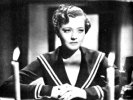Eye For Film >> Movies >> Sabotage (1936) Film Review
Sabotage has never quite attracted the same popular or critical acclaim as some of Hitch’s other British classics, such as The 39 Steps or The Lady Vanishes. But viewed now, in the context of the 7/7 London bombings and the ‘war on terror’, it seems eerily prescient - and more creepily unnerving than ever.
Like the two films mentioned above, its setting is the world of espionage and pre-war intrigue. But where they were freewheeling comedy-drama adventure stories, bristling with incident and witty dialogue, this is a more downbeat proposition altogether. The tone is cold and amoral, with even the heroic characters employing dubious methods to achieve their goals; death and destruction are regarded as almost ends in themselves and human beings are merely the game counters in their countries’ campaigns of asymmetric warfare.

It’s loosely adapted from Joseph Conrad’s novel The Secret Agent, but Hitchcock plays to his strengths by boiling it down to its essentials; a plan to blow up the heart of London on the day of the Lord Mayor’s Parade, and the police attempts to thwart it.
The chief agent of the plot is Verloc (Oskar Homolka) an émigré cinema owner living an outwardly respectable life with his much younger wife Winnie (Sylvia Sidney) and her schoolboy brother Stevie (Desmond Tester). But he supplements their income by undertaking acts of sabotage for a foreign power (never named, but generally thought to be Nazi Germany). The film opens with an ingeniously staged blackout of central London, the first of the film’s many coups de cinema.
Verloc is well pleased with his work, but when he meets his contact in a brilliantly menacing scene at the London Zoo aquarium, he’s told that all his efforts have done is “to make London laugh at us”. In order to get his money, he must plant a bomb in the cloakroom at Piccadilly Circus tube station, timed to go off on the afternoon of the parade.
The icily dispassionate way in which the contact gives his instructions is further proof Hitchcock could use more than just shock tactics to send a chill down the spine. And it’s followed by a striking montage (one of the first uses of the technique in his work) where a huge fish tank dissolves into a panoramic shot of Piccadilly Circus, which in turn melts before the eyes in a massive explosion.
Verloc begins to plan the job, enlisting the help of an “old fighter” who now runs a pet shop, to procure the explosives. But unbeknown to him, Ted the cheeky greengrocer (John Loder) from the stall next to the cinema is an undercover Scotland Yard detective. In order to get closer to Verloc he befriends Winnie and Stevie and finds himself falling for his quarry’s wife.
And tensions mount as covers are blown and the detonation draws near.
It’s a classic Hitchcock scenario and he handles it with his usual masterly aplomb. But what’s more remarkable about the film is its cynical tone. Verloc is a truly emotionless creature, utterly unconcerned about any suffering he may cause and motivated by money, not idealism. His opponent looks like the archetypal heroic leading man, but the audience is constantly invited to ask how much his flirting with Winnie and befriending of Stevie is a matter of duty, or prompted by less honourable motives.
Verloc’s fellow anarchists are an equally repellent bunch - from the self-deluding pet shop owner, who still dreams of being a glorious revolutionary despite being dominated by his shrewish daughter, to the gang of misfits and hotheads who congregate at Verloc’s house. The gap between their romantic self-perception and the sleazy reality of their activities strikes a definite chord in the post 7/7 world, as does the sense of London embodying a spirit that is everything they stand against – good-humoured, tolerant and laughing at adversity. As always, Hitch could wring the maximum cinematic tension from the sense of death and destruction looming over mundane, everyday life and this aspect of the film seems particularly relevant now.
It’s a shame that he either didn’t have the time, budget or inclination to capture the novel’s wider scope, and the usual crop of ‘comic’ interludes with cor-luv-a-duck minor characters blunt the impact even more than usual here. But this is still a gem of cinematic storytelling, backed by universally top-notch performances (Homolka in particularly is scarily good) and an increasing technical ambition. Hitch undoubtedly did better work (even within his British period) but all the things we love him for are here, and a bit more besides.
Reviewed on: 31 Aug 2008


















